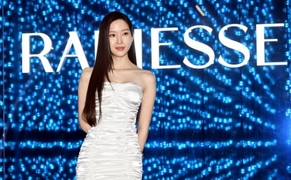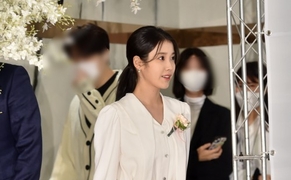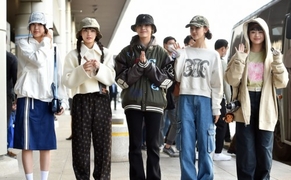GWU scholars visit headquarters as part of Summer Abroad Program/ Chairman Woo: "A meaningful connection that deepens Korea-U.S. friendship"
 |
| Participants of the George Washington University Institute for Korean Studies’ Summer Abroad Program pose for a commemorative photo with AsiaToday Chairman Woo Jong-soon (front row, right) during their visit to the AsiaToday headquarters on May 26. / Photo by Park Sung-il |
A delegation from the George Washington University (GWU) Institute for Korean Studies, based in Washington, D.C., visited the headquarters of AsiaToday in Yeouido, Seoul, on May 26 as part of its 2025 Summer Abroad Program.
Led by Yonho Kim, associate director of the institute, the group included undergraduate students, program managers, and local coordinators. During their visit, the delegation toured the company’s newsroom and watched an introductory video to gain firsthand insight into Korean society and the media environment.
Chairman Woo Jong-soon of AsiaToday warmly welcomed the group, emphasizing the importance of such exchanges. “Each one of you contributes to deepening the friendship between Korea and the United States,” he said. “George Washington University is not only one of the most prestigious institutions representing the U.S. capital, but also one that shares a special historical connection with Korea.”
Woo highlighted the university’s rising profile in Korean studies, noting that the institute was launched in October 2016 following a Korea Foundation-endowed professorship and has since offered key programs, including opportunities for students to visit Korea.
He also reflected on the university’s roots, explaining that President George Washington donated 50 shares of the Potomac Company to help establish a national university in D.C. The institution, founded in 1821 as Columbian College, was renamed George Washington University in 1904—the same year that Syngman Rhee, later the first President of South Korea, enrolled and went on to graduate in 1907.
 |
| Yonho Kim, associate director of the George Washington University Institute for Korean Studies (second from left, front row), shares his thoughts during a visit to AsiaToday headquarters on May 26, leading the Summer Abroad Program delegation. / Photo by Park Sung-il |
“After graduating from GWU in 1907, President Rhee went on to earn a master’s degree from Harvard University and a doctorate from Princeton,” Woo said. “Following the founding of the Republic of Korea on August 15, 1948, Rhee received the Distinguished Alumni Award from GWU in 1949. During his 1954 visit to the U.S.—just a year after the Korean War ended—he was celebrated as a hero of liberal democracy and awarded an honorary Doctor of Laws degree.”
Woo added that many Korean leaders have since studied at GWU or spent time in the United States, contributing significantly to Korea’s modernization and democratization. He encouraged the visiting delegation to enjoy and immerse themselves in Korean society: “I sincerely hope you will have a meaningful experience discovering Korean culture and people, and that your visit plants the seeds for further exchange and friendship.”
Professor Yonho Kim, associate director of the GWU Institute for Korean Studies, expressed gratitude for the visit. “We are honored to be received by Chairman Woo and the Asia Today team. It means a lot to be recognized for our efforts in enhancing U.S.-Korea relations and advancing Korean studies,” he said.
“This is our first time visiting Asia Today during the Summer Abroad Program, and I find it especially meaningful,” Kim noted. “Our program seeks to offer broad insights—not only into inter-Korean relations and political diplomacy but also Korea’s economy, society, culture, and media. We make a great effort to include diverse content through institutional visits.”
He added, “Though this is only the first day of our two-week program, I’m confident this year’s experience will be a great success.”
The GWU Summer Abroad Program runs from May 25 to July 7 and is structured around four major themes: Korean identity, culture, division, and reunification. Activities include reading sessions, discussions, field lectures, and on-site visits designed to deepen participants’ understanding of contemporary Korean society.
Most Read
-
1
-
2
-
3
-
4
-
5
-
6
-
7





















